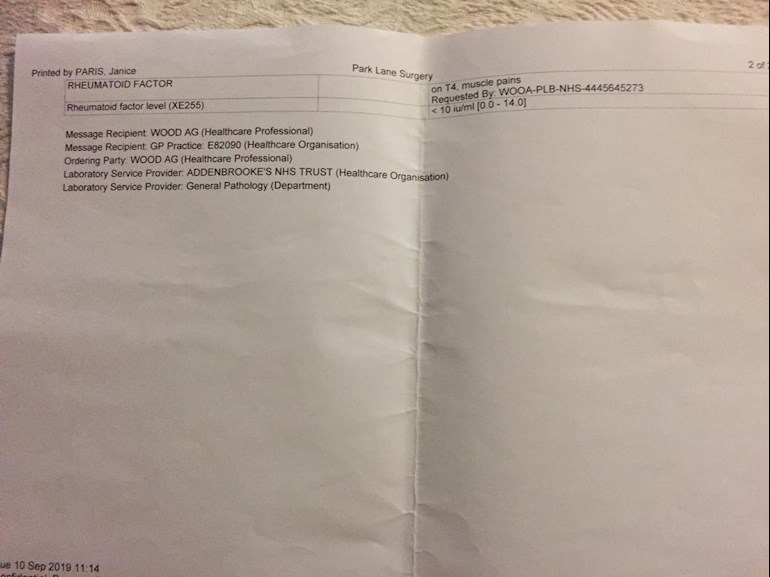Please could someone help me with these blood test results ...
BLOOD TEST RESULTS: Please could someone help me... - Thyroid UK
BLOOD TEST RESULTS

The normal range is 0-14, your result is less than 10, therefore your result is within range and so it's negative for rheumatoid factor.
labtestsonline.org.uk/tests... > What do the results mean >
What does the test result mean?
In patients with symptoms and clinical signs of RA the presence of significant concentrations of RF indicates that it is likely that they have rheumatoid arthritis (RA). 70-90% of patients with RA have positive RF test. In patients with symptoms of Sjögren’s syndrome, of the presence of RF can indicate that they have the condition. RF is found in 75-95% of patients with Sjogren’s syndrome.
A negative RF test does not exclude RA or Sjögren’s syndrome. About 20% of patients with RA or Sjögren’s syndrome will be persistently negative or have low levels of RF.
Positive RF test results may also be seen in healthy patients and in patients with conditions such as: infections; viral infection; endocarditis; tuberculosis; syphilis; systemic lupus erythematosus (lupus); sarcoidosis; cancer; or disease of the liver, lung, or kidney. The RF test is not used to diagnose or monitor these conditions.
Thank you seaside suzie ... I’m on Levo 25mcg and still unwell 😟
Can I suggest that you re-read the replies to your previous thread here:
healthunlocked.com/thyroidu...
You are undermedicated.
Even though you were started on 25mcg due to being 65, titration is testing/increasing by 25mcg every 6 weeks:
cks.nice.org.uk/hypothyroid...
How should I initiate and titrate levothyroxine?
•The dose of levothyroxine (LT4) should be individualized on the basis of clinical and biochemical (thyroid function tests) response. Treatment must be monitored regularly to determine an adequate dose and to avoid both under-treatment and over-treatment.
•The initial recommended dose is:◦For most people: 50–100 micrograms once daily, preferably taken at least 30 minutes before breakfast, caffeine-containing liquids (such as coffee or tea), or other drugs.◾This should be adjusted in increments of 25–50 micrograms every 3–4 weeks according to response. The usual maintenance dose is 100–200 micrograms once daily.
◦For people aged over 50 years and people with cardiac disease or severe hypothyroidism: 25 micrograms once daily, adjusted in increments of 25 micrograms every 4 weeks according to response.
•Once a stable thyroid-stimulating hormone (TSH) level is achieved and an adequate dose determined, arrange follow up to check thyroid function tests (TFTs) at 4–6 months and then annually.
The aim of a treated hypo patient generally is for TSH to be 1 or below or wherever it needs to be for FT4 and FT3 to be in the upper part of their reference ranges, if that is where you feel well.
You also need tests for:
Vit D
B12
Folate
Ferritin
Post results/reference ranges when you have them for further help. You said in your previous post that these were "normal" and you were asked for the numbers. You said you were told to take Ferrous-Aid, this is an iron tablet and you wouldn't be told to take that if your ferritin result was at a decent level.
And you wouldn't be given Calcichew if your Vit D was normal. Is there a reason you have a calcium/D3 tablet? There is more calcium than Vit D in that tablet. The amount of Vit D is less than a normal maintenance dose, so what was your Vit D level? Taking D3 aids absorption of calcium from food, so taking extra calcium may not be a good idea.
When taking D3 we need it's important cofactors - magnesium and Vit K2-MK7. K2-MK7 directs the calcium to bones and teeth where it is needed and away from arteries and soft tissues where it can be deposited and cause problems such as hardening of the arteries, kidney stones, etc. Magnesium helps D3 to work. We need Magnesium so that the body utilises D3, it's required to convert Vit D into it's active form. So it's important we ensure we take magnesium when supplementing with D3.
Your doctor wont know about these supplements as they're not taught much about nutrition.
Your previous post
healthunlocked.com/fibromya...
This clearly shows you are under medicated and need 25mcg dose increase in Levothyroxine
The aim of Levothyroxine is to increase the dose slowly in 25mcg steps upwards until TSH is under 2 (many patients need TSH significantly under one) and most important is that FT4 in top third of range and FT3 at least half way in range
Your TSH is too high and FT4 far too low
NHS guidelines on Levothyroxine including that most patients eventually need somewhere between 100mcg and 200mcg Levothyroxine.
nhs.uk/medicines/levothyrox...
Also what foods to avoid (eg recommended to avoid calcium rich foods at least four hours from taking Levo)
For full Thyroid evaluation you need TSH, FT4 and FT3 plus both TPO and TG thyroid antibodies tested. Also extremely important to regularly retest vitamin D, folate, ferritin and B12
Low vitamin levels are extremely common, especially if Thyroid antibodies are raised
Recommended on here that all thyroid blood tests should ideally be done as early as possible in morning and fasting. This gives highest TSH, lowest FT4 and most consistent results. (Patient to patient tip, best not mentioned to GP or phlebotomist)
Last Levothyroxine dose should be 24 hours prior to test, (taking delayed dose immediately after blood draw).
All four vitamins need to be regularly tested and frequently need supplementing to maintain optimal levels
If you haven't had vitamins or thyroid antibodies tested they need testing
Thyroid levels will need retesting 6-8 weeks after each dose increase
Official NHS guidelines saying TSH should be between 0.2 and 2.0 when on Levothyroxine and FT4 in top third of range
(Many of us need TSH nearer 0.2 than 2.0 to feel well)
See box
Thyroxine replacement in primary hypothyroidism